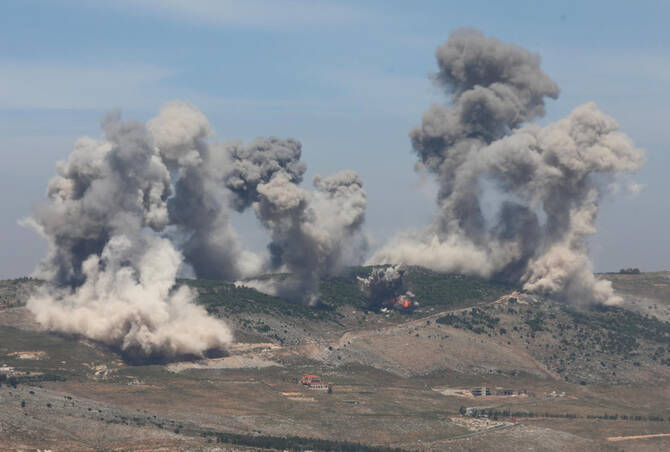
BEIRUT, Lebanon, May 8, 2025 (BSS/AFP) - Lebanese official media said Israel conducted heavy air strikes on the south on Thursday, the latest raids despite a fragile November ceasefire between Israel and Hezbollah.
The state-run National News Agency (NNA) said "Israeli warplanes carried out a wide-scale aerial aggression on the Nabatiyeh region, launching a series of heavy raids in two waves" targeting hills and valleys in the area, located around 12 kilometres (seven miles) from the border.
It said "huge explosions... echoed in most areas of Nabatiyeh and the south", causing "terror and panic" among residents, who rushed to pick up their children from school, as ambulances headed to the targeted areas.
An AFP photographer saw smoke rising from hills in the region.
"We heard a loud strike, about 10 consecutive blows," said Jamal Sabbagh, a 29-year-old doctor who was giving schoolchildren health checks near the city of Nabatiyeh.
"Some of the children were scared and there was panic, the teachers were also frightened," he told AFP.
The raids come a day after an Israeli strike killed a commander from Palestinian militant group Hamas in the southern city of Sidon.
Israel has continued to launch regular strikes in Lebanon despite the November 27 truce which sought to halt more than a year of hostilities with Hezbollah including two months of full-blown war.
Under the deal, Hezbollah was to pull back its fighters north of Lebanon's Litani River, some 30 kilometres (20 miles) from the Israeli border, and dismantle any remaining military infrastructure to its south.
Israel was to withdraw all its forces from Lebanon, but it has kept troops in five areas that it deems "strategic".
Hezbollah, long a dominant force in Lebanon, was weakened in its latest war with its arch-foe, which also saw an Israeli ground incursion and a slew of the group's senior commanders killed, including longtime leader Hassan Nasrallah.
Lebanon says it has respected its ceasefire commitments and has called on the international community to pressure Israel to end its attacks and withdraw all its troops.
Lebanese authorities have vowed to implement a state monopoly on bearing arms, though President Joseph Aoun has said disarming Hezbollah is a "delicate" matter that requires dialogue.
The November truce was based on a UN Security Council resolution that says Lebanese troops and United Nations peacekeepers should be the only forces in south Lebanon, and calls for the disarmament of all non-state groups.